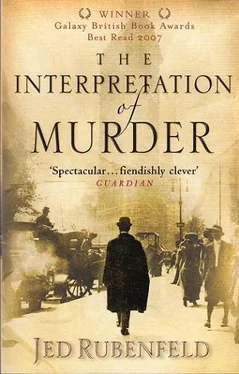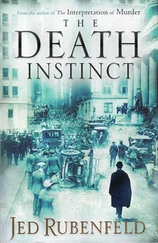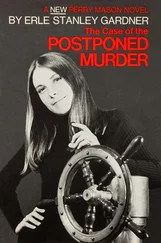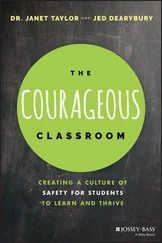Jed Rubenfeld - The Interpretation of Murder
Здесь есть возможность читать онлайн «Jed Rubenfeld - The Interpretation of Murder» весь текст электронной книги совершенно бесплатно (целиком полную версию без сокращений). В некоторых случаях можно слушать аудио, скачать через торрент в формате fb2 и присутствует краткое содержание. Жанр: Исторические приключения, на английском языке. Описание произведения, (предисловие) а так же отзывы посетителей доступны на портале библиотеки ЛибКат.
- Название:The Interpretation of Murder
- Автор:
- Жанр:
- Год:неизвестен
- ISBN:нет данных
- Рейтинг книги:5 / 5. Голосов: 1
-
Избранное:Добавить в избранное
- Отзывы:
-
Ваша оценка:
- 100
- 1
- 2
- 3
- 4
- 5
The Interpretation of Murder: краткое содержание, описание и аннотация
Предлагаем к чтению аннотацию, описание, краткое содержание или предисловие (зависит от того, что написал сам автор книги «The Interpretation of Murder»). Если вы не нашли необходимую информацию о книге — напишите в комментариях, мы постараемся отыскать её.
The Interpretation of Murder — читать онлайн бесплатно полную книгу (весь текст) целиком
Ниже представлен текст книги, разбитый по страницам. Система сохранения места последней прочитанной страницы, позволяет с удобством читать онлайн бесплатно книгу «The Interpretation of Murder», без необходимости каждый раз заново искать на чём Вы остановились. Поставьте закладку, и сможете в любой момент перейти на страницу, на которой закончили чтение.
Интервал:
Закладка:
Seeing Nora in the hotel lobby, I suspected I required treatment more than she. On the one hand, I doubted I would ever feel this way about anyone else; on the other, I was disgusted. In the caisson, when death loomed close at hand, I could think only of Nora. Seeing her now in the flesh, once again I could not get out of my mind the secret of her repugnant longings.
I must have stood staring a good deal longer than politeness permitted. Rose Brill came to my rescue, saying, 'You must be Miss Acton. We are friends of Dr Freud and Dr Younger. Can we help you, my dear?'
With admirable grace, Nora shook hands, exchanged pleasantries, and let it be known, without saying so, that she wished a word with me. I knew to a certainty that the girl had to be in inner turmoil. Her poise was remarkable, and not only for a seventeen-year-old.
Away from the others, she said, 'I've run away. I couldn't think of anyone else to go to. I'm sorry. I know I repulse you.'
Her last words were a knife in my heart. 'How could you possibly have that effect on anyone, Miss Acton?'
'I saw the look on your face. I hate your Dr Freud. How could he know?'
'Why have you run away?'
The girl's eyes welled up. 'They are planning to lock me up. They call it a sanatorium; they call it a rest treatment. My mother has been on the telephone with them since dawn. She told them I had a fantasy of being attacked in the night — and she raised her voice so that I would be sure to hear her, and Mr and Mrs Biggs too. Why can't I remember it more — more normally?'
'Because he gave you chloroform.'
'Chloroform?'
'A surgical anaesthetic,' I went on. 'It produces the very effects you experienced.'
'Then he was there. I knew it. Why would he do that?'
'So he could make it seem as if you had done it to yourself. Then no one would believe you about either attack,' I said.
She looked at me and turned away.
'I've told Detective Littlemore,' I said.
'Will Mr Banwell come for me again?'
'I don't know.' 'At least my parents can't send me away now.'
'They can,' I said. 'You are their child.'
'What?'
'The decision is theirs so long as you are a minor,' I explained. 'Your parents may not accept my word. We can't prove it. Chloroform leaves no trace.'
'How old must one be before one is no longer a child?' she asked with a sudden urgency.
'Eighteen.'
'I shall be eighteen this Sunday.'
'Will you really?' I was going to say that she therefore had no need to fear an involuntary confinement, but a foreboding overtook me.
'What's wrong?' she asked.
'We must fend them off until Sunday. If they succeed in hospitalizing you today or tomorrow, you could not be released until your parents said so.'
'Even after I turned eighteen?'
'Even after.'
'I will run away,' she said. 'I know — our summer cottage. Now they have come back, it's empty. It's the last place he'll look for me. It's the last place any of them will look. Can you see me there? It's only an hour away by ferry. The Day Line stops right in Tarry Town if you ask them. Please, Doctor. I have no one else.'
I considered. Getting Nora out of town was very sensible. George Banwell had somehow gotten into her bedroom wholly unobserved; he might get to her again. And Nora could hardly take the ferry herself: it wasn't safe for a young woman, particularly of Miss Acton's allure, to travel upriver alone. Everything else could wait until this evening. Freud was stuck in bed. If Brill's efforts to contact his friend at the New York Times proved fruitless, the next step would be for me to go to Worcester personally to speak with Hall, but I could do that tomorrow.
'I'll take you,' I said.
'Are you going to wear that suit?' she asked.
A half hour after the delivery of the morning post, the Banwells' maid informed Clara that a visitor — 'a policeman, ma'am' — was waiting in the foyer. Clara followed her maid to the marble entry hall, where her butler was holding the hat of a small, pale man in a brown suit, with beady, almost desperate eyes, a bushy mustache, and equally bushy eyebrows.
Clara started when she saw him. 'And you are — ?' she asked stiffly.
'Coroner Charles Hugel,' he replied, no less stiffly. 'I am chief investigator of the murder of Elizabeth Riverford. I would like a word with you.'
'I see,' replied Clara. She turned to her butler. 'Surely this is Mr Banwell's business, Parker, not mine.'
'I beg your pardon, ma'am,' answered Parker. 'The gentleman asked for you.'
Clara turned back to the coroner. 'Did you ask for me, Mr — Mr — ?'
'Hugel,' said Hugel. 'I — no, I merely thought, with your husband out, Mrs Banwell, that you — '
'My husband is not out,' said Clara. 'Parker, inform Mr Banwell that we have a caller. Mr Hugel, I am sure you will excuse me.' A few minutes later, from her dressing room, Clara heard a cascade of oaths sworn in George Banwell's deep voice, followed by a slamming of the front door. Then Clara heard her husband's heavy footsteps approaching. For a moment Clara's hands — applying powder to her lovely face — began to tremble, until she willed them still.
An hour and a quarter later, Nora Acton and I were steaming north up the Hudson River past the spectacular burnt-orange cliffs of New Jersey. We had left the Hotel Manhattan through a basement door, just in case — after I had changed clothes. On the New York side of the river, an armada of three-masted wooden ships was anchored under Grant's Tomb, their white sails flapping lazily in the bright sunshine, part of the elaborate preparations for the Hudson-Fulton celebrations this fall. A few puffs of cloud floated in an otherwise unblemished sky. Miss Acton sat on a bench near the prow, her hair flowing and tousled by the breeze.
'It's lovely, isn't it?' she said.
'If you like boats,' I answered.
'Don't you?'
'I'm against boats,' I said. 'There is first of all the wind. If people enjoy a wind in their face, they should stand in front of an electric fan. Then there are the exhaust fumes. And the infernal horn — the visibility is perfect, there's no one around for miles, and they blow that blasted horn so loud it kills entire schools of fish.'
'My father withdrew me from Barnard this morning. He called the registrar. Mother made him.'
'That is reversible,' I said, embarrassed to have been chattering so ridiculously.
'Did your father teach you to shoot, Dr Younger?' she asked.
The question took me by surprise. I couldn't tell what she meant by it — or if she even knew what she might have meant by it.
'What makes you think I can shoot?' I said.
'Can't all men of our social class shoot?' She uttered social class almost contemptuously.
'No,' I answered, 'unless you include shooting one's mouth off:
'Well, you can,' she said. 'I saw you.'
'Where?'
'I told you: at the horse show last year. You were amusing yourself at the shooting gallery.'
'Was I?'
'Yes,' she said. 'You seemed to be enjoying yourself a good deal.'
I looked at her for a long time, trying to see how much she knew. My father's suicide had involved a gun. Not to put too fine a point on it, he had blown his brains out. 'My uncle taught me,' I said. 'Not my father.'
'Your Uncle Schermerhorn or your Uncle Fish?'
'You know more about me than I realized, Miss Acton.'
'A man who lists himself in the Social Register can hardly complain if his relations are common knowledge.'
'I did not list myself. I was listed, just as you were.'
'Did you grieve when he died?'
'Who?'
'Your father.'
'What is it you want to know, Miss Acton?'
'Did you?'
'No one mourns a suicide,' I said.
'Really? Yes, I suppose the death of fathers is common. Your father lost a father, after all, and that father lost his too.'
Читать дальшеИнтервал:
Закладка:
Похожие книги на «The Interpretation of Murder»
Представляем Вашему вниманию похожие книги на «The Interpretation of Murder» списком для выбора. Мы отобрали схожую по названию и смыслу литературу в надежде предоставить читателям больше вариантов отыскать новые, интересные, ещё непрочитанные произведения.
Обсуждение, отзывы о книге «The Interpretation of Murder» и просто собственные мнения читателей. Оставьте ваши комментарии, напишите, что Вы думаете о произведении, его смысле или главных героях. Укажите что конкретно понравилось, а что нет, и почему Вы так считаете.












